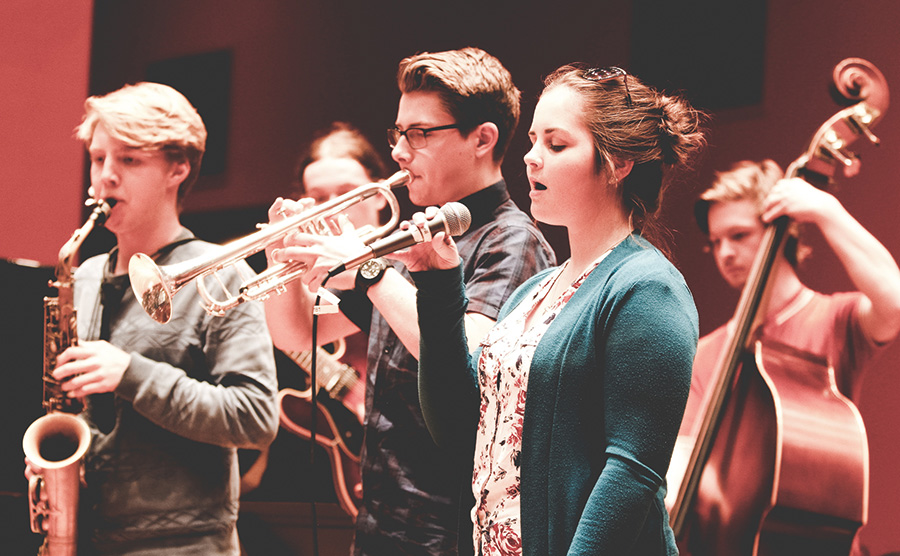Creative Collaboration is at the core of teaching at Monash University’s Sir Zelman Cowen School of Music and Performance. It is perhaps best exemplified by students of Critical Performance Studies who have worked with Melbourne Fringe, and with a range of internships in roles as different as festival production, marketing and event management. ‘There have been masterclass sessions with Meow Meow, Kait Kerrigan and Bree Lowdermilk, Moira Finucane and Eddie Perfect,’ said Professor Stacy Holman Jones, Deputy Head and the Research and Research Training Coordinator for the school.
The stellar names of past guest lists, according to Holman Jones, ‘are a terrific indication of the exciting opportunities in store for our students next year. You can have personalised career advice sessions with Fringe Creative Director and CEO Simon Abrahams, bespoke Fringe-directed work integrated learning sessions as part of the School’s Navigating the Performing Arts’ Sector unit, and a Fringe-sponsored third-year performance.’
There are also opportunities to go into depth with key industry figures. ‘In The Jeanne Pratt Artists in Residence program, there will also be a chance to work with top music theatre professionals in a series of four hands-on creative masterclasses across 2022,’ Holman Jones explained.
Holman Jones’ enthusiasm is palpable, ‘I love teaching students interested in theatre and performance – they are clever, curious and wildly creative! They create innovative and compelling work that changes the way I think about the world around me.’
The school covers music performance in classical, jazz and improvisation, popular song, composition and music technology, critical performance studies and scholarship. Teaching and research are designed to nurture creativity, collaboration, expertise and enterprise. For those seeking a career as a theatre artist, composer, arts and PR administrator or producer, stage manager or festival director, there are plenty of options at hand.
Critical Performance Studies (CPS) students learn skills and practices valued both inside and outside of the performing arts. They learn to collaborate and problem-solve, both highly employable attributes across any industry. They also learn to negotiate the nuances of storytelling, role-playing, empathy, improvisation, as well as team reliance and resilience, desirable skills that apply across industries.
Professor Margaret Barrett is both educator and practitioner; she is presently Head of the Sir Zelman Cowen School of Music and Performance. ‘My research focuses on how music development and engagement occurs across the lifespan, from the earliest years through to later life, and the enduring impacts of music engagement on life and learning,’ she told ArtsHub.
Barrett has extensive experience and has undertaken collaborative research partnerships with Musica Viva, the Australian Youth Orchestra, and the Australian Children’s Music Foundation. International roles have included President of the International Society for Music Education and Chair of the World Alliance for Arts Education.
Like Holman Jones, she stresses that students of CPS will have plenty of chances to extend their own collaborative reach, with the School offering not just joint creative ventures with the Melbourne Fringe and MLIVE, but an array of internationally recognised artists in residence and arts internships.
‘The CPS stream offers students many educational opportunities. The Jeanne Pratt Artist in Residence program, for instance, brings together theatre and music students to develop a new music theatre work in collaboration with an industry lead. There are masterclasses and support of the third-year capstone unit that includes a featured performance.’
A SAFE PLACE TO EXPERIMENT
For those wondering about how the CPS course itself will enhance their communication skills and improve future job prospects, Holman Jones points out that the course ‘offers an inclusive and safe laboratory for testing and working out responses to social problems on stage that can be translated into everyday life. Students will become experts in practicing performance as a way of thinking, feeling, and addressing the most critical questions and problems of our age as well as for creating more equitable, sustainable and secure futures.’
‘Our relationship with the Monash University Student Theatre (MUST) program and the Monash Performing Arts Centres give students a forum for presenting a range of works in a collaborative environment. All of these opportunities allow young professionals to be mentored in all aspects of performance, programming and producing,’ she said.
MORE THAN JUST ART FOR ART’S SAKE
The Sir Zelman Cowen School of Music and Performance takes pride in being at the forefront of music and critical performance research in Australia. But the faculty is not just interested in the development and nurturing of creative practice in music and theatre, but also the capacity of these media to interrogate issues of equality, social justice, exclusion and identity. There’s research presently conducted that addresses oppression and social and environmental inequities through music, theatre and performance.
With research published by some of the world’s most prestigious publishers and performances staged internationally, the resonance and impact of work undertaken and performed extend beyond local shores.
ENGAGEMENT WITH SOCIAL ISSUES
An example of the school’s active engagement in social, political, economic and cultural spaces, is through its relationship with the award-winning Afghanistan National Institute of Music (ANIM), founded by Monash Arts graduate Dr Ahmad Sarmast. In 2019, in conjunction with the Embassy of the Islamic Republic of Afghanistan in Australia and the Monash Gender, Peace and Security Centre, Monash students performed with ANIM’s all-female Zohra Orchestra in an event to mark the 50th anniversary of diplomatic relations between Australia and Afghanistan.
Through such collaborations, the school is active in drawing attention to geopolitical challenges and empowering students to drive societal change globally. The relationship with ANIM is ongoing, with an online concert fundraiser taking place at 6.00pm AEDT on 25 November, the United Nation’s International Day for the Elimination of Violence Against Women. The concert will be filmed at Monash’s David Li Sound Gallery and streamed on YouTube.
Barrett urged people to ‘demonstrate solidarity’ for the musicians and young people of Afghanistan by donating funds to support them. More information on the concert and how to donate is on available on the school’s website.
School staff are also involved in research projects aimed at addressing gender-based inequities and oppression in the Australian performing arts.
Different creative paths after studying CPS are entirely likely. After all, as Holman Jones points out: ‘Our graduates have gone on to successful lives and careers in the performing arts, law, and government. They are thought leaders and arts activists who are changing perceptions and lives by advocating for disability access in performing arts, the power of storytelling in sustaining First Nations communities, and the importance of queer world-making in tackling climate crisis – just to name a few!’.
Learn more about the Sir Zelman Cowen School of Music and Performance at Monash University.





